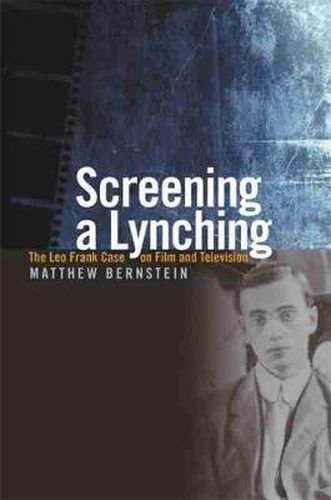Readings Newsletter
Become a Readings Member to make your shopping experience even easier.
Sign in or sign up for free!
You’re not far away from qualifying for FREE standard shipping within Australia
You’ve qualified for FREE standard shipping within Australia
The cart is loading…






This title presents an infamous lynching and its screen portrayals. The Leo Frank case of 1913 was one of the most sensational trials of the early twentieth century, capturing international attention. Frank, a northern Jewish factory supervisor in Atlanta, was convicted for the murder of Mary Phagan, a young laborer native to the South, largely on the perjured testimony of an African American janitor. The trial was both a murder mystery and a courtroom drama marked by lurid sexual speculation and overt racism. The subsequent lynching of Frank in 1915 by an angry mob only made the story more irresistible to historians, playwrights, novelists, musicians, and filmmakers for decades to come.Matthew H. Bernstein is the first scholar to examine the feature films and television programs produced in response to the trial and lynching of Leo Frank. He considers the four major surviving American texts: Oscar Micheaux’s film
Murder in Harlem
(1936), Mervyn LeRoy’s film
They Won’t Forget
(1937), the
Profiles in Courage
television episode
John M. Slaton
(1964), and the two-part NBC miniseries
The Murder of Mary Phagan
(1988). Bernstein explains that complex issues like racism, anti-Semitism, class resentment, and sectionalism were at once irresistibly compelling and painfully difficult to portray in the mass media. Exploring the cultural and industrial contexts in which the works were produced, Bernstein considers how they succeeded or failed in representing the case’s many facets. Film and television shows can provide worthy interpretations of history, Bernstein argues, even when they depart from the historical record. Screening a Lynching
is an engrossing meditation on how film and television represented a traumatic and tragic episode in American history - one that continues to fascinate people to this day.
$9.00 standard shipping within Australia
FREE standard shipping within Australia for orders over $100.00
Express & International shipping calculated at checkout
Stock availability can be subject to change without notice. We recommend calling the shop or contacting our online team to check availability of low stock items. Please see our Shopping Online page for more details.
This title presents an infamous lynching and its screen portrayals. The Leo Frank case of 1913 was one of the most sensational trials of the early twentieth century, capturing international attention. Frank, a northern Jewish factory supervisor in Atlanta, was convicted for the murder of Mary Phagan, a young laborer native to the South, largely on the perjured testimony of an African American janitor. The trial was both a murder mystery and a courtroom drama marked by lurid sexual speculation and overt racism. The subsequent lynching of Frank in 1915 by an angry mob only made the story more irresistible to historians, playwrights, novelists, musicians, and filmmakers for decades to come.Matthew H. Bernstein is the first scholar to examine the feature films and television programs produced in response to the trial and lynching of Leo Frank. He considers the four major surviving American texts: Oscar Micheaux’s film
Murder in Harlem
(1936), Mervyn LeRoy’s film
They Won’t Forget
(1937), the
Profiles in Courage
television episode
John M. Slaton
(1964), and the two-part NBC miniseries
The Murder of Mary Phagan
(1988). Bernstein explains that complex issues like racism, anti-Semitism, class resentment, and sectionalism were at once irresistibly compelling and painfully difficult to portray in the mass media. Exploring the cultural and industrial contexts in which the works were produced, Bernstein considers how they succeeded or failed in representing the case’s many facets. Film and television shows can provide worthy interpretations of history, Bernstein argues, even when they depart from the historical record. Screening a Lynching
is an engrossing meditation on how film and television represented a traumatic and tragic episode in American history - one that continues to fascinate people to this day.